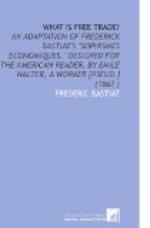Some time after this transaction, Mr. T dispatched another vessel, again freighted with national produce, to the amount of $200,000. But the vessel foundered in leaving the port, and Mr. T had only further to inscribe upon his books two little items, thus worded:
“Sundries due to X, $200,000, for purchase of divers articles dispatched by vessel N.”
“Profit and loss due, to sundries, $200,000, for final and total loss of cargo.”
In the meantime the custom-house inscribed $200,000 upon its list of exportations, and as there can of course be nothing to balance this entry on the list of importations, it hence follows that our enlightened members of Congress must see in this wreck a clear profit to the United States of $200,000.
We may draw hence yet another conclusion, viz.: that according to the Balance of Trade theory, the United States has an exceedingly simple manner of constantly doubling her capital. It is only necessary, to accomplish this, that she should, after entering into the custom-house her articles for exportation, cause them to be thrown into the sea. By this course, her exportations can speedily be made to equal her capital; importations will be nothing, and our gain will be, all which the ocean will have swallowed up.
You are joking, the protectionists will reply. You know that it is impossible that we should utter such absurdities. Nevertheless, I answer, you do utter them, and what is more, you give them life, you exercise them practically upon your fellow-citizens, as much, at least, as is in your power to do.
But lest even Mr. T’s books may not be deemed of sufficient weight to counterbalance the convictions of the Horace Greeley school of prohibition, I shall proceed to furnish a table exhibiting various classes of commercial transactions, embracing most of the classes usually effected by importing and exporting houses, all of which may result in undoubted profits to the parties engaged in them, and to the country at large, and yet which, as they appear in the annual Commerce and Navigation Reports issued by the government, would be made to prove by Mr. Greeley that the result has in each case been a loss to the country. The sums are all stated in gold:
A, represents one hundred merchants, who shipped to London beef, boots and shoes, butter, cheese, cotton, hams and bacon, flour, Indian corn, lard, lumber, machinery, oils, pork, staves, tallow, tobacco and cigars, worth in New York, in the aggregate, ten millions of dollars, gold, but worth in London plus the cost of transportation, &c., eleven millions of dollars, gold, in bond. After being sold in London, the proceeds (eleven millions) were invested in British goods, worth eleven millions in London, but worth twelve millions in bond in New York, and plus the cost of transportation, &c. After having these goods sold in New York, a net profit of two millions was the result of the whole transaction, a profit both to the merchants and the country; yet, according to the Commerce and Navigation Returns, the exports were ten millions, and the imports eleven millions (valued at the foreign place of production as the law directs), showing, according to Mr. Greeley’s solitary point of view, a loss to the country of one million.




